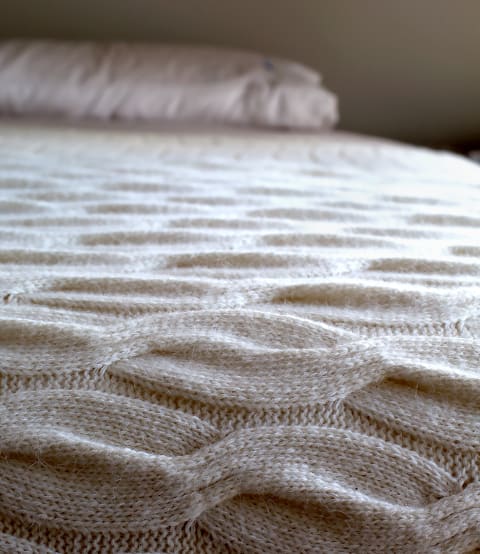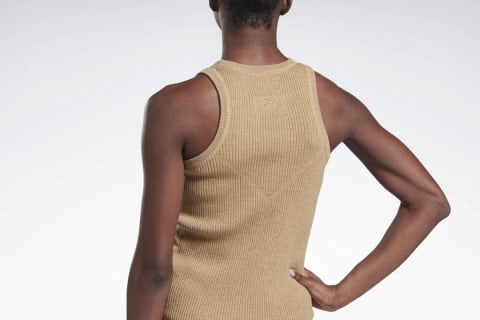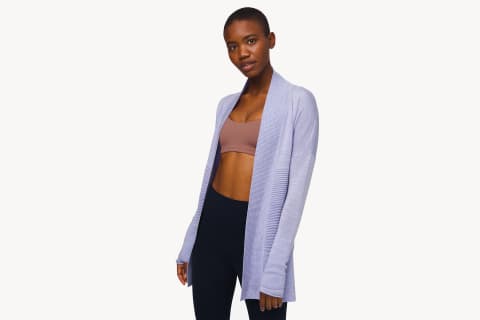Advertisement
Why Am I So Sweaty Right Now? 4 Reasons Why + Ways To Regulate Your Body Temperature

If you think your body only breaks a sweat when you're in HIIT circuit training mode or outside on a hot day, think again. While sweating is the body's natural way of keeping you cool, the reasons we perspire aren't always so obvious. They can range from what we eat, how we spend our days, and even what we wear—here are a few examples:
4 common things that can trigger perspiration:
- Your emotions. Right now, we're all going through a roller coaster of emotions every single day. One potential side effect of feeling all the feels is a little more day-to-day perspiration than we're used to. How you feel emotionally can actually affect your body temperature, especially if you're stressed. Feeling overly anxious is one of the root causes of excessive sweating, and emotions like anger, fear, or embarrassment can be triggers as well. Body temperature increases in response to stressful situations, and if you're dealing with ongoing, unrelenting stress, this rise in body temperature could even escalate into a fever. Otherwise, if you're looking down from the top of a skyscraper or watching a scary movie, you might just find yourself wiping your palms on your pants.
- Your clothes. Speaking of pants, if you're sweatier today than you were yesterday, it might be as simple as what you're wearing. Fabrics like nylon and polyester trap in heat and don't allow your skin to breathe. Natural fibers like Merino wool and cotton, on the other hand, allow for plenty of airflow and breathability. In fact, Merino wool, the softest and finest type of wool grown predominantly in Australia, is 100% natural, renewable, biodegradable and one of the most breathable fibers for your skin. Unlike synthetic fibers, Merino wool is an active fiber that is able to change with your body's temperature. It is able to absorb a large amount of moisture vapor and move it away to evaporate into the air—instead of drip down your back or soak into your shirt.
- Your sleep hygiene. Ever wake up in a pool of sweat, pajamas drenched, and your comforter kicked aside? You might have a case of the night sweats, which can be caused by a number of things—some of which include your sleeping habits. Eating or exercising too close to bedtime can fire up your metabolism, which increases heat production (normally, our body temperature naturally dips just before bed to help us sleep) and disrupt our sleep1. Similarly, things like an extra-warm bedroom or bedding that traps in heat can have the same effect. Sleeping on or under wool can also improve your thermal comfort zone, which has been proven to aid a more restful night, helping you fall asleep faster, for longer and have a better-quality rest.
- Your morning triple-shot latte, spicy foods, or a nice pour of pinot with dinner. Certain things we eat and drink—especially foods that are hot and spicy, alcohol, and caffeinated drinks—are known to trigger perspiration. There's even a special name for perspiration while eating: gustatory sweating. While it's not uncommon to get a little sweaty over a dinner of hot, spicy foods, talk with your doc if you find yourself excessively sweating at every meal.

How to help regulate your body temperature for better health.
No one likes to soak through their new favorite shirt at lunch or have beads of sweat on their forehead during a presentation at work. If you're having trouble keeping your body temperature under control, a few easy tips can help boost your confidence and well-being.
If you can relate to any of the above scenarios, consider curbing your caffeine and alcohol intake, avoid triggering spicy foods, and add mindfulness-based stress-reduction techniques—such as yoga, meditation, and a breathwork practice—into your routine.
Choosing naturally breathable clothing.

On top of that, choosing the right fabric for the clothes we wear while working, exercising, and sleeping can make all the difference. It's the closest thing to our skin, after all! When you wear a fabric that breathes and keeps you cool and dry, you'll feel more comfortable and even sleep more soundly.
One way to build a healthier wardrobe is to opt for more natural materials, which tend to be more versatile—and sustainable—for everyday wear. Think of Merino as your year-round BFF (not just during sweater season): Merino wool is an easygoing and extremely functional material that can keep your body cool and warm, adapting to whatever your surroundings might be and actively working as your body temperature changes. In other words, it works just as well on a chilly outdoor run and in your apartment living room for an at-home yoga routine. It also absorbs odor molecules from sweat, which means even if you do get hot during a workout or on a particularly humid day, Merino wool can help keep you smelling fresh. It's even a dream to sleep in. Research has shown that wearing Merino wool provides a 12-minute average sleep onset compared to 27 minutes in cotton and 22 minutes in polyester. It naturally regulates your temperature, intuitively listening to your body while you snooze.
So, where do you find great-quality Merino wool? Many brands and retailers use the fabric in everything from sleepwear to performance wear, but you may need to check the clothing's label to identify authentic Merino wool to enjoy all of its technical benefits. Woolmark is the global leader in certifying wool clothing that isn't just authentic and high quality within the fabric itself but is a symbol of trust, which connects us back to the people who grow this fine fiber. You may even already have some Merino pieces in your closet that you can rediscover, or you can shop a few of our current favorite pieces below!
Shop Merino wool wardrobe essentials below and visit here for more:



